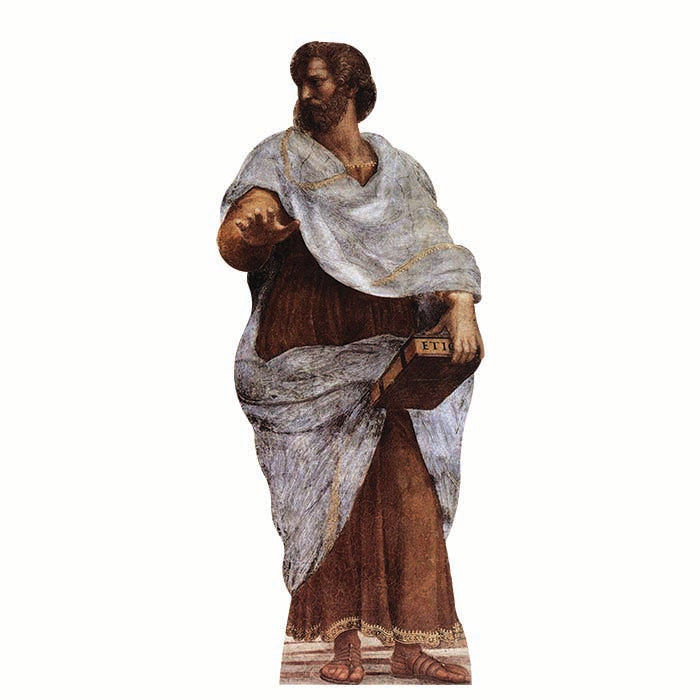Introduction to Philosopher Aristotle
Celebrate the legacy of one of the most influential philosophers in Western history with our lifesize cardboard cutout of Aristotle. Perfect for philosophical discussions, educational events, or as an inspiring addition to your home or office, this cutout captures the insightful presence of Aristotle, reflecting his profound impact on philosophy, science, and education.
Background of Philosopher Aristotle
Aristotle was born in 384 BCE in Stagira, a small town in northern Greece. His father, Nicomachus, was the court physician to the Macedonian king, which gave Aristotle early exposure to scientific inquiry. At the age of 17, Aristotle moved to Athens to study at Plato’s Academy, where he remained for 20 years, first as a student and later as a teacher.
After Plato’s death, Aristotle left Athens and spent some time traveling and studying various subjects. He tutored Alexander the Great, the future conqueror of much of the known world, which further expanded his influence. In 335 BCE, Aristotle returned to Athens and established his own school, the Lyceum. There, he conducted extensive research and wrote on a wide range of subjects, including logic, metaphysics, ethics, politics, biology, and rhetoric.
Aristotle’s works are vast and varied, but some of his most significant contributions include his "Nicomachean Ethics," where he explores the nature of happiness and virtue; "Politics," where he examines the functioning of city-states and the role of citizens; and "Metaphysics," where he investigates the nature of reality and existence. His "Poetics" is one of the earliest surviving works on dramatic theory, and his "Rhetoric" laid the groundwork for the study of persuasive speech.
Aristotle’s empirical approach to studying the natural world, which involved detailed observation and classification, set the stage for the development of the scientific method. His influence extended across various fields, making him one of the most comprehensive thinkers in history.
Aristotle died in 322 BCE in Euboea, Greece, but his works continued to shape intellectual thought for centuries, influencing both the Islamic Golden Age and the European Renaissance.
Cultural Impact of Philosopher Aristotle
Aristotle’s impact on philosophy, science, and education is profound and enduring. His writings have shaped Western intellectual tradition and continue to be studied and revered in various academic disciplines.
In philosophy, Aristotle's development of formal logic was groundbreaking. His syllogistic logic became the basis for deductive reasoning and influenced the way logical arguments were structured for centuries. His works on metaphysics and epistemology addressed fundamental questions about the nature of reality, knowledge, and existence, laying the foundation for future philosophical inquiry.
Aristotle's ethical theory, particularly his concept of the "Golden Mean," emphasized the importance of moderation and balance in achieving a virtuous and fulfilling life. His "Nicomachean Ethics" remains a cornerstone in the study of ethics and moral philosophy, influencing countless thinkers and ethical frameworks.
In politics, Aristotle’s "Politics" explored the organization and functioning of city-states, advocating for a balanced government that promotes the common good. His ideas about citizenship, governance, and the role of the state have informed political theory and practice throughout history.
Aristotle’s contributions to the natural sciences were equally significant. His empirical approach to studying the natural world laid the groundwork for the scientific method. His observations and classifications in biology, particularly in zoology, were unprecedented for his time and remained influential for centuries.
Aristotle's work in rhetoric and poetics also had a lasting impact. His analysis of tragedy in "Poetics" influenced literary criticism and the understanding of dramatic structures, while his "Rhetoric" provided foundational insights into the art of persuasion.
The legacy of Aristotle’s thought extends beyond his immediate influence, impacting Islamic, Christian, and Jewish medieval scholarship. His works were preserved and translated by scholars in the Islamic Golden Age, and later reintroduced to Europe during the Renaissance, where they became central to the revival of classical knowledge.
Today, Aristotle’s contributions are celebrated in academic institutions and his works are essential reading in philosophy, science, political theory, and literature courses. His intellectual legacy continues to inspire and challenge scholars, ensuring that his ideas remain integral to the study of human knowledge and understanding.
This cutout of Aristotle celebrates his remarkable contributions and enduring legacy as a master philosopher and scientist. It serves as a tribute to his intellectual brilliance, his impact on the development of Western thought, and his significant role in shaping various fields of study.

LIFE SIZE HISTORICAL CUTOUTS
We have been the leading historical based cutout supplier for nearly 10 years. We have worked with many schools, museums, and colleges across the country to provide stunning graphics from history. Historical Cutouts are available in 3 materials and come contour cut with an easel to be self standing. Click below to learn more about each material and our cutout process.

LIFE SIZE HISTORICAL WALL DECALS
All of our historical figures are available as a life size wall decals. Vinyl wall decal orders come ready to apply with squeegee and instructions. Having trouble? Check out our how-to YouTube video. Our graphics are printed on tear resistant PhotoTex Vinyl using our high definition 4-color plus white printing process.

HISTORICAL ACRYLIC CUTOUTS
Desktop Legends are a smaller version of our life size cutouts printed on 3/16" acrylic. All of our historical cutouts are also available as a desktop legend. These acrylic statuettes come in two sizes, 8" and 12". If you would like to learn more please click below.















